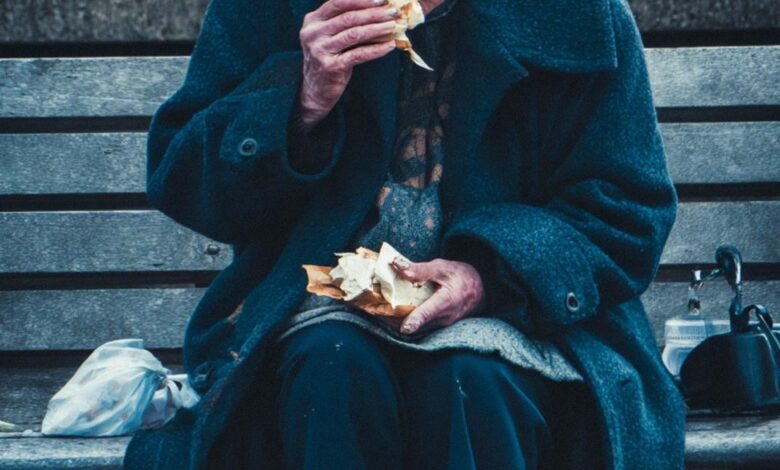
When Ana sat on a quiet bench outside a small store with a fresh sandwich balanced on her lap, she didn’t expect her afternoon to change the course of her life. She had traveled two train stops out of her way to pick up that sandwich from a bakery she loved—a crusty loaf filled with herbed chicken, fennel slaw, and a lemony spread. While her boyfriend, Arman, tried on yet another black shirt inside the store, Ana planned to savor the sandwich alone, treating herself to something familiar from her grad school days.
But before she could take a bite, an elderly woman slipped onto the bench beside her. The stranger moved carefully, with the quiet apology of someone who had learned how to take up as little space as possible. Her coat was old, missing a button, and her hands were clasped tightly in her lap. Strands of gray hair escaped a bun that looked hastily tied.
The woman’s eyes lingered on Ana’s sandwich—not with greed, but with longing. When Ana caught her gaze, the woman smiled, though it carried more sadness than warmth.
“Enjoy your meal, sweetheart,” she said softly. “You look exactly like my granddaughter.”
Ana’s chest tightened at the words. She managed a small smile. “Then she must have been beautiful.”
“She was,” the woman replied. “But she died two and a half years ago. Since then, I’ve just been… existing.”
The confession struck Ana like a bell. Something stirred in her memory: an old shoebox hidden behind her winter coats, filled with scraps of her past that she never fully understood.
Without thinking, she tore the sandwich in half and held it out. “Are you hungry?”
The woman’s eyes brimmed instantly with tears. She nodded, almost ashamed, and accepted the food. Ana felt her own throat tighten. “Please eat this,” she said. “And I’ll run inside to get you some groceries. Don’t go anywhere—I’ll be right back.”
The woman hesitated. “That’s too kind. Please, don’t trouble yourself.”
“It’s not trouble,” Ana insisted. “It’s just human.”
Inside the store, Ana filled a basket with oatmeal, canned soup, apples, bananas, tea, and bread. But when she returned outside, the bench was empty. Only a small piece of sandwich crust remained.
“She must have been shy,” Arman said gently, taking the grocery bag from her hands. “You tried, Ana. Sometimes that’s all you can do.”
But Ana couldn’t shake the woman’s words: You look exactly like my granddaughter. That night, she pulled out the dusty shoebox she had nearly forgotten. Inside were fragments of her beginnings: a hospital bracelet, a newspaper clipping, and half of a torn photograph. The image showed a young woman holding a baby—her smile tender, her hair parted just like Ana’s. On the back, in faded blue ink, one word was written: Stay.
The following afternoon, a knock at Ana’s door startled her. When she opened it, the woman from the bench stood there, still wearing the same worn coat.
“I’m sorry I left yesterday,” she said quickly. “I didn’t want you spending money on me. My name is Tamara.”
She extended a small photograph with trembling fingers. Ana’s breath caught—the torn edge matched the picture in her shoebox. It was the missing half of the photo.
Ana ran to retrieve her box, and when the two pieces were pressed together, the image became whole again.
“I had to be sure,” Tamara whispered. “I knew I’d seen you before. You aren’t just kind, sweetheart. You’re family.”
Over tea at Ana’s kitchen table, the truth spilled out. Tamara revealed that Ana’s birth mother, Daria, had been young, poor, and overwhelmed when she gave birth to twin girls. Unable to raise both, she made the agonizing choice to place Ana for adoption. Daria raised the other twin, Alina, with Tamara’s help.
“Alina was my granddaughter,” Tamara said, tears in her eyes. “She passed away two years ago. And before she died, she made a list—things she wanted to do. The first was to find you. She always knew she had a sister.”
Ana sat frozen, her heart pounding. “My parents told me I was adopted. But I never knew about a sibling.”
Tamara nodded. “No one told us where you went. But when I saw you yesterday, I knew. You’re her sister.”
The weight of the revelation pressed against Ana’s chest. She thought of her adoptive mother, Kate, who had raised her with unconditional love. Would this truth change everything?
When Ana finally told Kate, her mother listened quietly before pulling her into a fierce hug. “I didn’t know you had a twin,” Kate said softly. “If I had, I never would have agreed to a closed adoption. But I want you to know this doesn’t change anything. You’ve always been my daughter.”
For the first time, Ana felt like she was holding two truths at once: the life she had, and the life she might have had.
In the days that followed, she and Tamara visited Alina’s favorite places—the bakery where she had once bought “suspended sandwiches” for strangers, the gelato stand she loved, and the little park where she used to paint. Each story Tamara told stitched another thread of Alina’s memory into Ana’s heart.
One evening, Ana and Arman walked home with lemon gelato in her hand, her favorite flavor, sharp and bright. “I keep thinking about her,” Ana said quietly. “My sister. I didn’t know her, but I still feel like I lost her.”
Arman squeezed her hand. “And now, in some way, you’ve found her too.”
Ana smiled through the ache. She had spent her whole life feeling complete. But now, with Tamara beside her and Alina’s memory finally uncovered, she realized that family wasn’t about what was missing—it was about what you found and chose to hold on to.
And for the first time in years, Ana felt like she wasn’t wandering anymore. She was arriving.